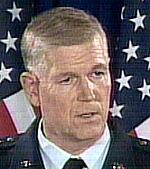2007年VOA标准英语-Retired Top US Generals Say Troop Surge Require(在线收听)
Washington
06 April 2007
Growing opposition in Congress to the war in Iraq is raising hard questions about whether the president's plan to send nearly 30,000 additional troops to Baghdad is too little, too late. But a former chairman of the U.S. Joint Chiefs of Staff says the troop surge will require more time and patience from the American public to make sure it works. VOA's Mil Arcega reports.
 |
| General Richard Myers |
General Richard Myers, Retired Joint Chiefs Chairman provides an encouraging numbers on the escalation of violence.
"There's been a 30 to 40 percent reduction in violence in the way that we measure it. That's pretty encouraging," he says.
General Richard Myers, a retired former chairman of the Joint Chiefs of Staff, is cautious about drawing any conclusions, but he says preliminary figures suggest the U.S. troop surge is already achieving the desired effect.
"And for the first time, as I understand it, Iraqis are now paying for more of their armed forces training and equipment than the U.S. is for the first time this year, so there are signs here that things are on the right track," he says.
With about half of the additional troops requested by President Bush now in place, reports show sectarian killings are down but suicide bombings are up. Jason Campbell is a military analyst at the Brookings Institution in Washington.
"Initially what we saw in the first three weeks of the surge was a sharp decrease in the amount of unidentified bodies found in Baghdad that showed signs of being either tortured or executed," he explains. "That number went to about 125 in the first three weeks. However, in the second three weeks of the surge, ending at the end of March, we saw that number almost double to 230."
Campbell says although the increased security has had a positive effect in parts of Baghdad, the larger military presence appears to have pushed the violence into other areas such as Baquba, where attacks have risen as much as 30 percent.
"What we're seeing now is that the violent attacks are spreading beyond Baghdad into areas that up until the last few months were not necessarily known for being areas of violence," Campbell says.
General Myers says the plan needs more time. He adds that the $120 billion supplemental funding bill approved by Congress, which sets a timetable for a U.S. pullout, would have dire consequences for Iraq's fledgling government.
"Not easy, the government's a year old," he notes. "Parliament in the end has acted in the best interests of the country. It's not been a pretty sight, but they're making progress. I hate to see that end too early. At the same time, as the president said, patience in this country wears thin."
The full complement of U.S. troops in Iraq will not be fully deployed until early June. President Bush says he will veto any funding bill that sets a timetable for troop withdrawal.